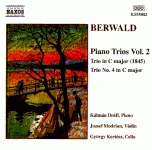This re-issue of a 1991 Marco Polo recording apparently is the only version available of these piano trios (two C major works and two fragments in C and E-flat) by Franz Berwald. It is the second of two releases of all his attempts in the genre. His 1845 C major work, which predates his officially numbered trios, has plenty of energy and melody but lacks the discipline of a more mature composer. All three performers on this recording–pianist Kálmán Dráfi, violinist Jozsef Modrian, and cellist György Kertész–inject Berwald’s occasionally long-winded lines with life-sustaining enthusiasm and give full attention to clarity of line and evenness of balance. That said, there are quite a few places where intonation is a problem. Both violin and cello have trouble with the large interval leaps at the end of the exposition and with the main motif of the development in the first movement. The tone at the high end of the violin is strident at times, mostly at the top of octave jumps.
The two fairly substantial Trio fragments are interesting filler for completists. The E-flat major, nearly a full opening movement that was abandoned for other ideas, offers some pleasant, sunny melodies in the final section. The C major fragment is a document of Berwald’s thoughts on improving the C major trio, and from the sound of it he was on to something. However, the same octave leaps that gave the string players trouble in the original are still a problem. In both fragments, the musicians stop where Berwald did in his manuscript, which is quite acceptable for the purposes of authenticity.
Instead of more revision, the Trio No. 4 is essentially a new work, with the odd quote from the previous two attempts, and this piece shows Berwald more in command of his craft. Again the players give committed interpretations, but poor intonation once more mars some lovely spots, such as the cello introduction of the main theme in the first section, and both strings in the unison passages before the final section of the Presto. Recorded sound is clean enough, but dry, very small, and boxed-in, restricting the dynamic range of the instruments. The piano is a bit too far back and is occasionally lost in the balance. The Trio No. 4 is available in a good performance by Susan Tomes and the Gaudier Ensemble on Hyperion. If you must have everything Berwald wrote and can’t wait for better performances of the other pieces, the budget price of this Naxos disc makes it an attractive option.
































